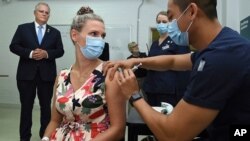More than 1 in 5 Australians say they will “probably” or “definitely” not be vaccinated against coronavirus. New research has shown a spike in doubts over the vaccine as a mass inoculation program starts Sunday. A survey of about 3,500 people by the Australian National University found a “significant and substantial” increase in hesitancy since the same people were asked about getting the shot in August.
In multicultural Australia, the government is urging minority groups to receive a coronavirus vaccine. However, public health campaigns don’t always work or reach their intended audience. The result is that there can be suspicion or ignorance of the inoculation process in migrant communities.
New research from the Australian National University has found similar reservations among many women, Indigenous people and those with less education.
Professor Nicholas Biddle is the study’s co-author.
“There is a very large increase in the proportion of Australians who said they probably wouldn’t or definitely wouldn’t get a vaccine from about 12.5% in August to about 21.5% in January 2021,” he said.
Biddle believes low rates of COVID-19 in Australia have given some groups a false sense of security.
“The fact that Australia has had relatively low rates of infection and very low rates of mortality might mean that people are somewhat complacent and do not see the vaccine as being necessary. What we need to do is remind people that, A, the vaccine is effective, B, that it has been tested so it is safe. It is only with a vaccine that your life can return to some form of normalcy,” he said.
Two drugs, developed by Pfizer and Astra-Zeneca, have been approved for use in Australia, where a mass inoculation program started Sunday.
Senior health officials have insisted the drugs have gone through a thorough quality and safety review process. Priority for vaccinations will be given to workers at quarantine hotels for returned travelers, front-line health workers and nursing home residents and staff.
Australia has recorded 28,920 COVID-19 cases since the pandemic began. Nine hundred and nine people have died, according to the Health Department.




